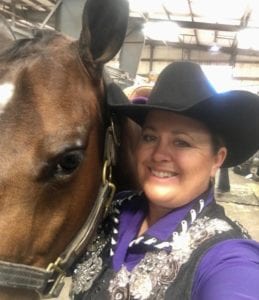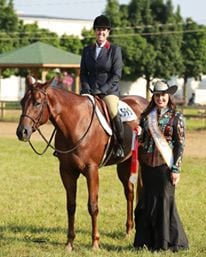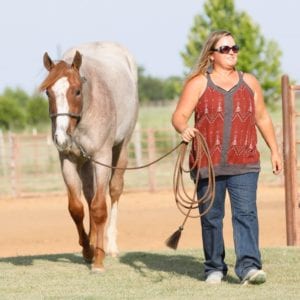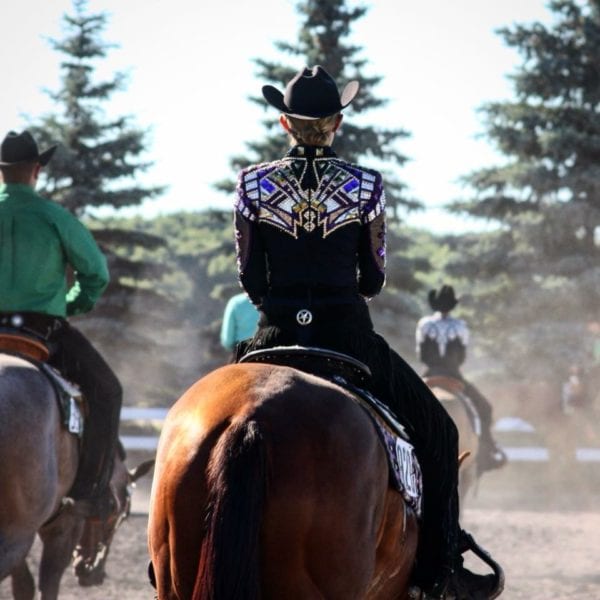Not a news flash: horses are expensive. And when showing at a top level of competition, usually the more talented the horse is, the larger the price tag. Unfortunately, not all of us can afford to spend the price of a luxury car on a show horse. Most trainers are also not in the position to be able to turn down horses that may be on the lower spectrum of physical abilities.
We spoke with three of the industry’s successful trainers about how they make the most out of cheaper or less talented horses and still achieve success for their clients.
Goals, Goals, Goals
Julie Voge from Whitesboro, Texas has worked with some of the best horses in the nation. But, like most trainers, she also enjoys bringing horses to their utmost potential despite their price tag or talent.
 Voge (pictured right) explains, “I don’t think less talent and less expensive always go hand-in-hand. I have had expensive horses that don’t have any heart and don’t want to try. And I’ve had cheap horses that will give you everything they have. It’s simply a matter of what you feel works best for the client and their goals with their horse.”
Voge (pictured right) explains, “I don’t think less talent and less expensive always go hand-in-hand. I have had expensive horses that don’t have any heart and don’t want to try. And I’ve had cheap horses that will give you everything they have. It’s simply a matter of what you feel works best for the client and their goals with their horse.”
Chelsea Carlson, self-admitted ‘believer in the underdog’ is owner/operator of Red’s Show Horses in Oregon. Trainer of multiple AQHA Champions and AQHA Year End Award Winners, Carlson prides herself on working with her clients and their budgets to make the most out of what they can afford.
She explains, “Honestly, all of the clients I’ve had have come from ‘the bottom.’ Most of my current clients came to me with unbroke horses, to which we’ve improved or sold and stepped up. Anything is possible with hard work and an honest relationship with you and your trainer.”
Carlson adds, “I try to do what’s best for the owner. Depending on their goals, we either decide to sell their horse to get to the next step or make their horse the best it can be. To me, it’s all about whatever each client wants. But at the end of the day, I will be honest with them about the level their horse will compete at.”
Reserve AQHA World Champion and Multiple AQHA Congress Champion, Farley McLendon, who also hails from Whitesboro, Texas, focuses on bringing out the best of each of her horses in training no matter the price tag or physical talent level. When working with one that may be of lower ability, she states, “I do my best to get that particular horse caught up on a level where I am happy. If they can get to that point, then I might keep pushing for just that little bit more.”
Biting the Budget Bullet
 Haven’t we all dreamt of finding a ‘diamond in the rough?’ Who hasn’t driven past a random field of horses only to study their conformation and movement hoping that the next world champion is lost in Farmer Brown’s backyard and with a simple knock on the door can be bought for pennies? When working with clients and smaller budgets, these top trainers work to make their customer’s needs met the best that they can.
Haven’t we all dreamt of finding a ‘diamond in the rough?’ Who hasn’t driven past a random field of horses only to study their conformation and movement hoping that the next world champion is lost in Farmer Brown’s backyard and with a simple knock on the door can be bought for pennies? When working with clients and smaller budgets, these top trainers work to make their customer’s needs met the best that they can.
McLendon (pictured left) discusses her strategy when working with a smaller budget. “I look at the criteria for what the client needs, start shopping and then present them with what I think would work best. Then, we narrow down and go try out which ones would fit the best. There might have to be some give and take on each end to make everyone happy, but it usually works out.
“For example, cheaper often comes with maintenance issues, so if that client is spending more on vet bills and possibly sitting out shows, then I have to suggest their money might be better spent on a better horse. It’s not fun to sit out.”
 Voge likes to use the time to her advantage when dealing with a smaller shopping budget. Either way, she wants to get the best results despite the price tag of the animal. She explains, “Sometimes with a small budget, we gamble on long yearlings but then have to wait a year to see what we have. Sometimes, we buy a horse that has some maintenance issues that we can live with. And sometimes we’ve spent a lot of money, and the horse didn’t live up to our expectations. It’s all a gamble to some extent.”
Voge likes to use the time to her advantage when dealing with a smaller shopping budget. Either way, she wants to get the best results despite the price tag of the animal. She explains, “Sometimes with a small budget, we gamble on long yearlings but then have to wait a year to see what we have. Sometimes, we buy a horse that has some maintenance issues that we can live with. And sometimes we’ve spent a lot of money, and the horse didn’t live up to our expectations. It’s all a gamble to some extent.”
Voge continues, “Sometimes when shopping on a budget, we have to think outside the box as trainers. Can the client pay more for a finished horse up front but maybe can only afford to go to a show a month? Or do they have a small purchase price budget, but the monthly training and hauling to shows is no problem for them? That’s where good communication comes in.”
Carlson agrees that sometimes a smaller budget means more time put in for a result, whether that is waiting for a youngster to grow or waiting for a horse to develop its abilities in training. “To me, my time is worth money. My clients know I put in a lot of effort to prepare them and their horses to show. In the long run in buying a horse, I’ve been known for either getting a great deal or having an eye for a diamond in the rough. I’m willing to put in the effort to get the most for my clients.” Carlson continues, “When it comes to purchasing, if they have the time, I will try to get them the most natural talent for the money.”
Making It Work
Trainers want to see their clients and their horses succeed. When working with projects which may be less talented, trainers usually end up putting in more effort to maximize their potential.
 McLendon discusses, “The downfalls of a less talented individual sometimes means double the work with the result not being exactly what they think it should. We, as trainers, strive to get every ounce out of our horses. Some can overcome their deficiencies. Other just can’t. It costs the same to feed one that is willing versus one that isn’t. From my experience, it’s usually double the work, double the repetition. A lot more sweat equity to get the positive result. But again, some horses are not capable.”
McLendon discusses, “The downfalls of a less talented individual sometimes means double the work with the result not being exactly what they think it should. We, as trainers, strive to get every ounce out of our horses. Some can overcome their deficiencies. Other just can’t. It costs the same to feed one that is willing versus one that isn’t. From my experience, it’s usually double the work, double the repetition. A lot more sweat equity to get the positive result. But again, some horses are not capable.”
Voge agrees, “I don’t think anyone shops for a horse with no talent. Sometimes budgets keep you from affording the complete package. But, I feel every horse can be good at something. If you don’t like what that horse is good at, find someone who does and start with a new project.”
Carlson looks at the big picture when considering talent or price of a horse. “Either way, the money invested each month is nearly the same. You can choose to invest in something that will give back over time or something that you’ll lose money on at a certain point.
“Even if a horse is less talented, there is a purpose for them in the long run,” Carlson believes. “Horses that are less talented can be great teachers in the pen. It is much more beneficial to make a mistake on one of those horses than the one you have invested a lot in.”
Chelsea adds, “I am a firm believer in the underdog. Some of my best clients (and horses) started there, and that doesn’t ever deter me. I believe you can make it if you put the work in and are set in the right program for it.”
About the Author – An AQHA Professional Horseman, Mo West, recently moved to Cave Creek, AZ. Formerly a high school English teacher for over 15 years, she now pursues her passion for training, showing and coaching. She is an avid world traveler and loves boats and the water. Fishing is her second favorite activity, and she always has her beloved dog, Crash at her side whenever possible. Her biggest supporter, Stephen Holmes and his two heeler pups, Boondocks and Huckleberry, are never too far behind and can often be seen working hard at major horse shows across the country.








